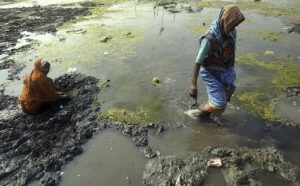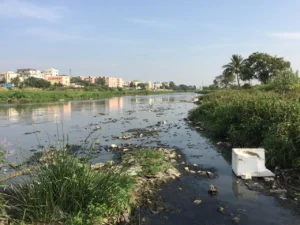Welcome to our deep dive into an increasingly pressing issue: the role of farming and the pharmaceutical industry in environmental pollution and the proliferation of superbugs. This article will untangle the complicated web of ways these respective fields contribute to environmental degradation and health concerns, such as rising levels of pollution and the alarming growth of antibiotic-resistant bacteria, often referred to as superbugs.
From farming pharmaceutical pollution fuelling warns to farming pharmaceutical health pollution superbugs un, we will cover a range of related keywords to ensure you receive a comprehensive understanding of this critical topic.
The Unseen Consequences: How Farming Pharmaceutical Pollution is Fuelling Environmental Concerns
As we delve deeper into the environmental impact of our actions, a concerning pattern emerges, particularly in the realms of agriculture and pharmaceutical manufacturing.
 These sectors, while crucial to our wellbeing, emit a variety of pollutants that wreak havoc on ecosystems worldwide.
These sectors, while crucial to our wellbeing, emit a variety of pollutants that wreak havoc on ecosystems worldwide. - Experts warn that the discharge of chemicals and antibiotics into our waters and soils is not just detrimental to wildlife but also fuels an environment ripe for the rise of antimicrobial resistance.
The interplay between farming pharmaceutical pollution fuelling warns and the broader implications on health and biodiversity cannot be overstated.
This pollution arises from residues of pharmaceutical products used in livestock farming and the waste from pharmaceutical manufacturing. Both pathways contribute to a cycle of pollution that, if unaddressed, could have dire consequences for our planet's future. Taking cognizance of this issue is the first step toward implementing sustainable practices that reduce pollution and safeguard our environment.
Escalating Threats: The Rise of Farming Pharmaceutical Pollution
In recent years, the global community has witnessed a disturbing trend: the substantial increase in pollution stemming from both the farming and pharmaceutical sectors.
 This rise, documented in numerous studies, poses a direct threat to environmental health and undermines years of conservation efforts. The indiscriminate use of pesticides, fertilizers, and antibiotics in agriculture contributes significantly to the contamination of water sources, soil degradation, and a decrease in biodiversity. Concurrently, the pharmaceutical industry's inadequate disposal methods for chemical waste add another layer of complexity to the problem.
This rise, documented in numerous studies, poses a direct threat to environmental health and undermines years of conservation efforts. The indiscriminate use of pesticides, fertilizers, and antibiotics in agriculture contributes significantly to the contamination of water sources, soil degradation, and a decrease in biodiversity. Concurrently, the pharmaceutical industry's inadequate disposal methods for chemical waste add another layer of complexity to the problem.
The farming pharmaceutical pollution rise warns of an urgent need to reevaluate and reform agricultural and manufacturing practices. Adoption of sustainable and eco-friendly methods is not just optional but vital. As the pollution levels continue to climb, so too does the urgency for comprehensive strategies that address this multifaceted issue head-on, taking into consideration the health of our planet and its inhabitants.
Global Health at Risk: How Pharmaceutical Pollution Contributes to Superbug Emergence
One of the most alarming consequences of unchecked pharmaceutical pollution is its role in the development and spread of antibiotic-resistant bacteria, or superbugs.
These organisms emerge when antibiotics in the environment kill susceptible bacteria, leaving behind those that can resist treatment. This process is exacerbated by the runoff of pharmaceuticals into natural water systems from both agriculture and industry. Such contamination not only affects aquatic life but also facilitates the transfer of resistance genes to human pathogens. The link between farming pharmaceutical pollution rise superbugs un and global health risks is undeniable.
The rise of superbugs represents a significant challenge to modern medicine, rendering some antibiotics ineffective and complicating the treatment of once easily curable infections. Addressing this issue requires global cooperation in monitoring and managing pharmaceutical discharges and developing stronger regulations to prevent antibiotic misuse in farming and health care.
UN's Warning Bell: The Looming Crisis of Farming Pharmaceutical Health Pollution
The United Nations has sounded the alarm on the burgeoning crisis posed by pollution from the farming and pharmaceutical sectors.
 Notifications from various UN bodies highlight the urgent need to address these environmental and health challenges head-on. Such farming pharmaceutical health pollution fuelling superbugs, farming pharmaceutical health pollution concerns are gaining traction globally, as they threaten not only the intricacy of our ecosystems but also the very fabric of human health.
Notifications from various UN bodies highlight the urgent need to address these environmental and health challenges head-on. Such farming pharmaceutical health pollution fuelling superbugs, farming pharmaceutical health pollution concerns are gaining traction globally, as they threaten not only the intricacy of our ecosystems but also the very fabric of human health.
The accumulation of harmful substances in the environment, resulting from excessive and irresponsible use of chemicals in agriculture and the pharmaceutical industry's by-products, calls for an immediate reevaluation of current policies and practices.
The UN's warnings advocate for strengthened international standards and collaborative efforts to mitigate pollution and ensure the sustainability of our shared planet. The integration of environmentally friendly practices and the reduction of antibiotic use in farming are critical steps in averting this looming crisis.
A Toxic Cocktail: The Role of Agricultural and Health Pollution in the Environment
The intertwined roles of agricultural practices and pharmaceutical waste introduce a toxic cocktail into our environment, with far-reaching implications.
The unregulated spread of chemicals, including pesticides, herbicides, and medication residues, into our soil, water, and air symbolizes a growing environmental menace. This farming pharmaceutical health pollution not only endangers wildlife populations and disrupts ecosystems but also has profound implications for human health.
Findings reveal that toxins can accumulate in the food chain, leading to potential health risks for populations worldwide.
Moreover, the symbiotic relationship between farming pharmaceutical health pollution fuelling rise in environmental degradation and the deterioration of public health becomes evidently clear. Advocacy for integrated management approaches and stricter regulatory frameworks is essential to curtail the adverse effects of these pollutants. Embracing sustainable agricultural techniques and promoting responsible pharmaceutical waste management are pivotal in dismantling this toxic mix and steering towards a healthier planet.
Tackling the Tide: Strategies Against Pharmaceutical Pollution and Superbug Proliferation
Confronting the tide of pharmaceutical pollution and the resultant rise of superbugs requires concerted efforts and strategic planning.
Central to these efforts is the farming pharmaceutical pollution fuelling rise un, which advocates for a multifaceted approach to battle this dual threat. Firstly, implementing stricter regulations on both pharmaceutical waste disposal and the use of antibiotics in agriculture can significantly reduce environmental contamination.
Education and awareness campaigns targeting farmers, pharmaceutical companies, and the general public play a crucial role in promoting best practices and responsible antibiotic use. Moreover, investing in research for developing alternatives to antibiotics and seeking innovations in pharmaceutical waste treatment technologies are vital steps.
These strategies intended to curtail farming pharmaceutical pollution fuelling rise warns emphasize the importance of collaboration among governments, industries, and communities to foster a sustainable environment. By adopting a proactive stance, we can limit the negative impacts of pharmaceutical pollution and superbug proliferation, safeguarding the health of our planet for future generations.
